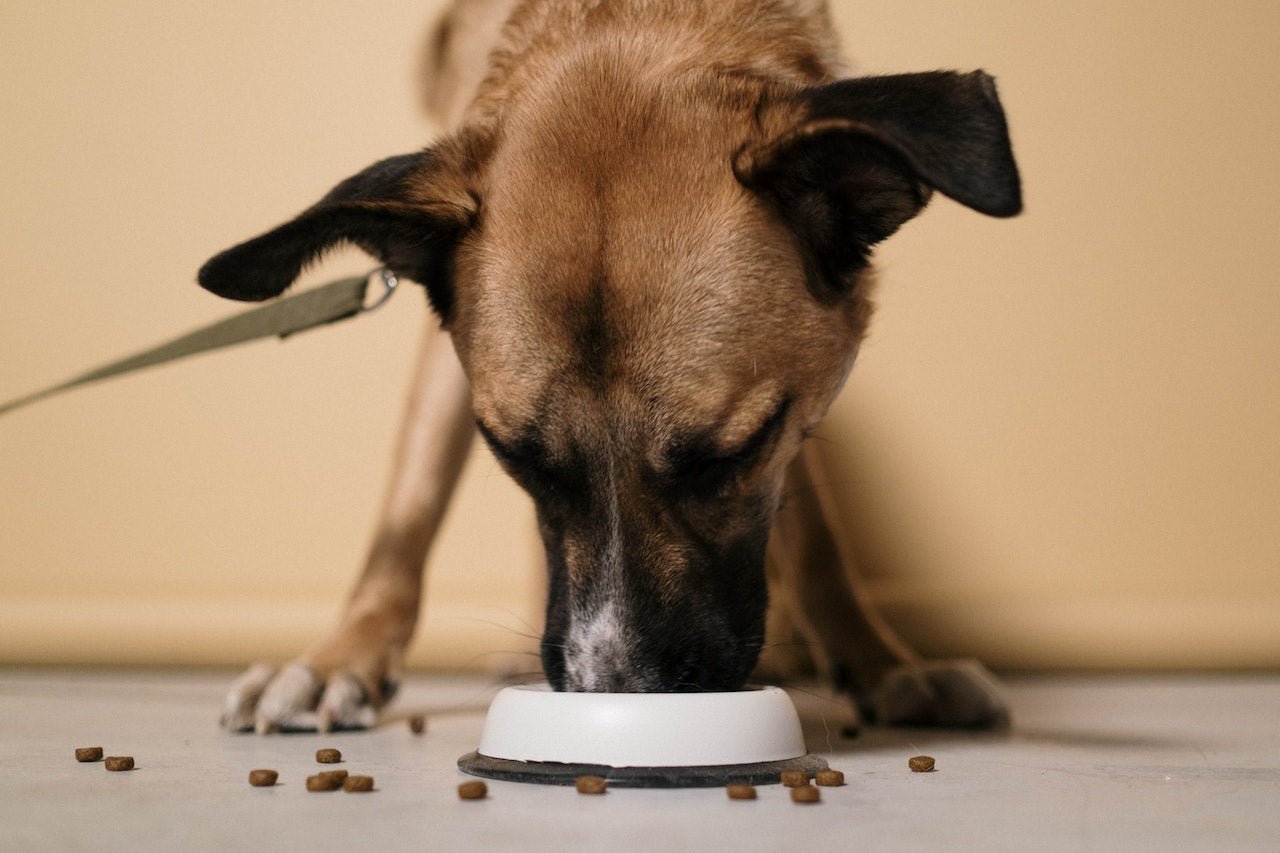Welcome to our comprehensive blog post on how to help your dog sleep at night. Much like their human companions, dogs require quality rest to sustain their health and overall well-being. Many dog owners, however, are unaware that their four-legged friends can also suffer from sleep issues, much like humans do.
Are you wondering what to give your dog to sleep at night? This blog post is designed to guide you through the importance of quality sleep for dogs, explore common sleep challenges they may encounter, and offer you both natural methods and the best sleeping pills for dogs to make sure your furry friend receives the rest they deserve.
We'll also delve into various sleep aids, including the pros and cons of melatonin for dogs, and discuss other options like 1mg melatonin dosages specifically designed for dogs. Senior dog owners, in particular, may be interested in our section dedicated to the best sleep aid for senior dogs. For those who prefer natural remedies, we'll answer the question: "Can I give my dog melatonin gummies?"
Stay tuned to learn more about the full range of sleep solutions for your canine companion.
Related: Stop Dogs From Barking

Part I: Understanding the Sleep Needs of Dogs Before diving into the solutions, it's crucial to understand the sleep needs of dogs. We will discuss the different sleep patterns and durations in various dog breeds, as well as the factors that can affect their sleep requirements. Factors such as age, size, activity level, and health conditions can all play a role in determining how much sleep your dog needs. We will also highlight the signs of sleep deprivation in dogs and the importance of providing a comfortable sleep environment.
Part II: Natural Methods to Help Your Dog Sleep Better In this section, we will explore various natural methods that can help improve your dog's sleep quality. We'll recommend exercise routines and toys to keep dogs engaged and tired. A consistent sleep schedule, massages, and calming music promote better rest. We'll also cover selecting the right dog bed and using natural remedies to reduce stress for a comfortable sleep environment.
Part III: Medications and Supplements to Aid Dog Sleep Sometimes, natural methods may not be enough to address your dog's sleep issues. In this section, we will explore the use of medications and supplements to aid dog sleep. We will discuss prescription medications commonly used for sleep disorders in dogs, potential side effects, and risks associated with their use. We will also delve into over-the-counter sleep aids such as melatonin and herbal supplements like valerian root and chamomile. However, we strongly emphasize the importance of consulting with a veterinarian before administering any sleep aid to your dog. What To Give Your Dog To Sleep.
Part IV: Safety Considerations and Conclusion In the final section, we will address safety considerations when it comes to sleep aids for dogs. We will highlight potential risks associated with their use and the importance of monitoring your dog's response. Consulting a veterinarian is crucial to discuss potential risks and benefits before administering any sleep aid. We will conclude the blog post by summarizing the natural methods and lifestyle changes discussed throughout the article and emphasize the importance of ensuring your dog gets quality sleep.
By implementing these sleep solutions for dogs, you can help your furry companion enjoy restful nights and wake up refreshed and rejuvenated. Stay tuned for the upcoming sections where we will delve deeper into each aspect of promoting better sleep for your beloved dog.
Related: Dog Yeast Infection
Understanding the Sleep Needs of Dogs
Sleep is an essential aspect of a dog's overall health and well-being. Just like humans, dogs require adequate rest to recharge and maintain their physical and mental health. However, it's important to note that the sleep needs of dogs can vary based on several factors, including breed, age, size, activity level, and health conditions.
Sleep Patterns and Duration in Different Dog Breeds
Different dog breeds have varying sleep patterns and duration. What To Give Your Dog To Sleep. Some breeds are known to be more active and require less sleep, while others are more prone to longer periods of rest. For instance, high-energy breeds such as Border Collies or Australian Shepherds may sleep less and spend more time engaged in activities. On the other hand, smaller breeds like Chihuahuas or Bulldogs may need more sleep due to their lower energy levels.

Factors Affecting a Dog's Sleep Requirements
Several factors can influence a dog's sleep requirements. Age and life stage play a significant role in determining how much sleep a dog needs. Puppies, for example, require more sleep than adult dogs as their bodies and brains are still developing. Senior dogs may also require additional rest due to age-related changes and potential health issues.
The size and activity level of a dog also impact their sleep needs. Larger breeds tend to have longer sleep cycles and may require more sleep overall. Active and working dogs, such as herding or hunting breeds, may need more sleep to recover from their physical exertion. Conversely, dogs with lower activity levels, such as lap dogs or toy breeds, may have shorter sleep cycles.
Health conditions can also affect a dog's sleep patterns. Pain, discomfort, or underlying medical issues may lead to disrupted or insufficient sleep. It's important to address any health concerns with your veterinarian to ensure your dog's sleep quality is not compromised.
Related: Dog Stung By Bee
Signs of Sleep Deprivation in Dogs
Just like humans, dogs can experience sleep deprivation, which can have adverse effects on their overall well-being. What To Give Your Dog To Sleep. It's important for dog owners to be aware of the signs that indicate their furry friends may not be getting enough quality sleep.
These signs may include:
- Excessive daytime sleepiness or lethargy
- Difficulty staying awake or falling asleep during the day
- Irritability or mood changes
- Reduced appetite or weight loss
- Lack of energy or enthusiasm during activities
- Decreased cognitive function or difficulty concentrating
It's crucial to recognize these signs and take appropriate measures to improve your dog's sleep if necessary. Restful sleep is vital for their physical and mental health, and addressing any sleep issues can help ensure their overall well-being.
The Role of a Comfortable Sleep Environment
Creating a comfortable sleep environment is essential to promote quality sleep for your dog. Providing a cozy and secure space where they can rest undisturbed is crucial. Consider the
following factors when setting up your dog's sleep environment:
- Choosing the right dog bed: Select a bed that is appropriate for your dog's size and breed. Consider their sleeping preferences, whether they prefer a plush bed, raised cot, or orthopedic mattress for added comfort and support.
- Bedding materials: Opt for bedding materials that are soft, hypoallergenic, and easy to clean. This helps maintain a clean and comfortable sleep surface for your dog.
- Temperature and lighting: Ensure the sleep area is at a comfortable temperature and free from excessive light or noise. Dogs are more likely to sleep soundly in a cool, dark, and quiet environment.
- Minimizing disruptions: Create a designated sleep area away from high-traffic areas or noisy appliances. This helps minimize disruptions and allows your dog to relax and sleep without disturbances.
By understanding the sleep needs of your dog and providing a comfortable sleep environment, you can take the necessary steps to ensure they get the quality rest they need. What To Give Your Dog To Sleep. In the next section, we will explore natural methods to help improve your dog's sleep.

Natural Methods to Help Your Dog Sleep Better
While some dogs may experience sleep issues that require medical intervention, many sleep problems can be addressed through natural methods and lifestyle changes. By implementing these strategies, you can help your furry friend achieve better sleep and overall well-being.
Related: Zyrtec for Dogs
Regular Exercise and Mental Stimulation
Regular exercise is crucial for a dog's physical and mental health, and it can greatly impact their sleep quality. Engaging your dog in daily exercise routines helps burn off excess energy, promotes relaxation, and contributes to a more restful sleep. The type and duration of exercise will depend on your dog's breed, age, and overall health.
For high-energy breeds, activities like brisk walks, jogging, or interactive games such as fetch can help tire them out. On the other hand, low-energy breeds may benefit from shorter walks or gentle play sessions.
In addition to physical exercise, mental stimulation is essential for ensuring a tired and satisfied pup. Mental activities such as puzzle toys, treat-dispensing toys, or obedience training sessions can help stimulate their brains and tire them out mentally. Mental exhaustion can often be as effective as physical fatigue in promoting better sleep for dogs.
Establishing a Bedtime Routine
Just like humans, dogs benefit from a consistent bedtime routine that signals it's time to wind down and prepare for sleep. Establishing a consistent sleep and wake-up schedule can help regulate their internal clock and promote better sleep patterns.
Aim for a routine that includes winding-down activities before bedtime. This can include a relaxing walk, gentle playtime, or a calming massage. Avoid stimulating activities or intense play sessions close to bedtime, as this can hinder their ability to settle down for sleep.
Creating a calm environment in the evening is essential for promoting relaxation. Dim the lights, play soft, soothing music, or use essential oils with calming scents. These sensory cues can help signal to your dog that it's time to relax and prepare for sleep.
Creating a Comfortable Sleep Environment
Providing a comfortable sleep environment is crucial for helping your dog achieve restful sleep. Choose a designated sleep area that is quiet, free from distractions, and comfortable for your dog. Consider their preferences and needs when selecting a bed. Orthopedic beds can provide added support for dogs with joint issues, while plush beds may offer extra coziness for dogs who love to burrow.
The bedding materials you choose can also impact your dog's sleep quality. Opt for hypoallergenic materials that are soft and easy to clean. Regularly washing the bedding helps maintain cleanliness and freshness.
Reducing Anxiety and Stress
Anxiety and stress can significantly impact a dog's sleep quality. Separation anxiety, noise phobias, or fear of certain situations can all contribute to sleep disturbances. It's important to address these underlying issues to help your dog feel more relaxed and secure.
If your dog experiences separation anxiety, gradually desensitizing them to your departure and providing them with interactive toys or treat puzzles can help alleviate their anxiety. Creating a safe and comforting space, such as a crate or a designated area with familiar scents, can also help reduce anxiety.
For dogs with noise phobias, such as thunderstorms or fireworks, providing a safe haven where they can retreat to during these times can help minimize stress. Additionally, using calming supplements or natural remedies, such as pheromone diffusers or herbal sprays, can help promote a sense of relaxation and aid in better sleep.
By incorporating regular exercise, establishing a bedtime routine, creating a comfortable sleep environment, and addressing anxiety and stress, you can significantly improve your dog's sleep quality. In the next section, we will explore medications and supplements that can aid in promoting better sleep for dogs.
Medications and Supplements to Aid Dog Sleep
While natural methods can be effective in improving your dog's sleep, there may be instances where additional support is needed. In such cases, medications or supplements can be considered to aid in promoting better sleep for your furry companion. However, it is important to consult with a veterinarian before administering any sleep aids to ensure their safety and appropriateness for your dog's specific needs.

Prescription Medications for Sleep Disorders in Dogs
In some cases, veterinarians may prescribe medications to help manage sleep disorders in dogs. These medications are typically used in specific situations or for certain medical conditions that may disrupt a dog's sleep. Sedatives or anxiolytics may be prescribed to help calm dogs with severe anxiety or to manage sleep disturbances caused by underlying medical conditions.
However, it is crucial to note that these medications should only be used under the guidance of a veterinarian and should never be administered without proper consultation.
It is important to be aware of potential side effects and risks associated with prescription medications. Some dogs may experience drowsiness, confusion, or gastrointestinal upset. Additionally, certain medications may have contraindications or interactions with other drugs your dog may be taking.
Your veterinarian will provide detailed instructions and closely monitor your dog's response to ensure the medication is safe and effective.
Over-the-Counter Sleep Aids for Dogs
There are also over-the-counter sleep aids available for dogs that can help promote better sleep. One commonly used supplement is melatonin. Melatonin is a hormone that regulates the sleep-wake cycle in both humans and dogs. It can be used to help regulate sleep patterns and promote relaxation. However, it is crucial to use melatonin specifically formulated for dogs and to follow the recommended dosage provided by your veterinarian.
While melatonin is generally considered safe, it is always best to consult with your veterinarian before administering any supplements to your dog.
Related: Can A Dog Overdose On CBD?
Herbal supplements can also be considered as a natural
alternative to aid in promoting better sleep. Valerian root and chamomile are two commonly used herbs known for their calming properties. These herbs can help reduce anxiety and promote relaxation, which may aid in sleep. However, as with any supplement, it is important to consult with a veterinarian to ensure the appropriate dosage and to discuss any potential interactions with other medications your dog may be taking.
Consultation with a Veterinarian
Before considering any sleep aids for your dog, it is crucial to consult with a veterinarian. They will be able to assess your dog's specific needs, evaluate any underlying medical conditions, and provide appropriate guidance. Your veterinarian will take into consideration your dog's overall health, potential risks, and benefits of sleep aids, and help determine the most suitable course of action.
It is important to remember that sleep aids should never be used as a substitute for addressing the underlying causes of sleep issues. Natural methods, lifestyle changes, and addressing anxiety or stress should always be the first line of defense. Medications and supplements should only be used when necessary and under the guidance of a veterinarian.
In the next section, we will discuss safety considerations when using sleep aids for dogs and conclude with a summary of natural methods to promote better sleep.

Safety Considerations and Conclusion
When it comes to using sleep aids for dogs, safety should always be a top priority. While some medications and supplements can be beneficial in promoting better sleep, it is important to be aware of potential risks and take necessary precautions to ensure the well-being of your furry friend.
Potential Risks Associated with Sleep Aids
Any medication or supplement, whether prescription or over-the-counter, carries potential risks and side effects. It is essential to understand these risks and discuss them with your veterinarian before giving any sleep aid to your dog. Some sleep aids may cause drowsiness, confusion, or gastrointestinal upset. In rare cases, certain medications may have more severe side effects or contraindications, especially if your dog has underlying health conditions or is taking other medications.
It is also important to consider the long-term effects of sleep aids. While they may provide temporary relief, relying solely on sleep aids without addressing the underlying causes of sleep issues may not be a sustainable solution. It is crucial to work with your veterinarian to identify and address any underlying health issues, anxiety, or stress that may be impacting your dog's sleep.
Love your pup every day the easy way with Dope Dog. Check out their full line of pet-safe CBD products today. Shop now!
Monitoring Your Dog's Response
When using sleep aids for dogs, it is important to closely monitor their response and behavior. Observe any changes in sleep patterns, behavior, appetite, or overall well-being. If you notice any concerning symptoms or side effects, contact your veterinarian immediately. Regular communication with your veterinarian is crucial to evaluate the effectiveness of the sleep aid and make any necessary adjustments to the dosage or treatment plan.
Importance of Consulting a Veterinarian
Consulting with a veterinarian is paramount before giving your dog any sleep aid. They will be able to assess your dog's specific needs, evaluate any underlying health conditions, and recommend the most appropriate sleep aid, if necessary. Your veterinarian's expertise and guidance will ensure the safety and well-being of your dog throughout the process.
Summary of Natural Methods to Promote Better Sleep
While sleep aids can be helpful in certain situations, it is important to remember that natural methods and lifestyle changes should be the first line of defense in promoting better sleep for your dog. Regular exercise, mental stimulation, establishing a bedtime routine, and creating a comfortable sleep environment are all essential components of ensuring your dog gets the quality sleep they need.
By providing adequate exercise, mental stimulation, and a consistent bedtime routine, you can help regulate your dog's sleep patterns. Creating a comfortable sleep environment with the right bed, bedding materials, and temperature can contribute to their relaxation and sleep quality. Additionally, addressing anxiety and stress through training, desensitization, and creating a safe space can help alleviate sleep disturbances.
In conclusion, promoting better sleep for your dog requires a holistic approach. Natural methods should always be the first step, and sleep aids should only be considered when necessary and under the guidance of a veterinarian.
By understanding your dog's sleep needs, addressing underlying issues, and implementing appropriate strategies, you can help your furry friend achieve the restful sleep they deserve.
Love your pup every day the easy way with Dope Dog. Check out their full line of pet-safe CBD products today. Shop now!


















